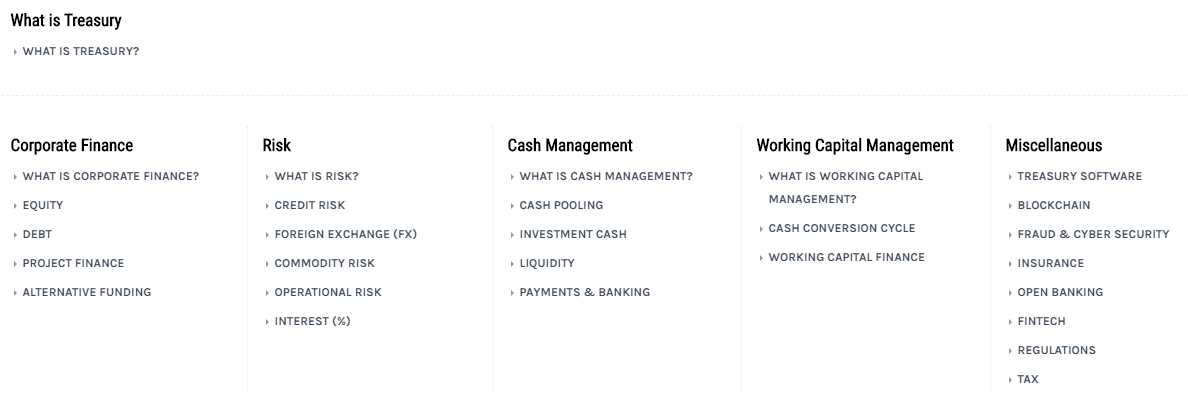| 25-2-2020 | by Kendra Keydeniers |
Cash Management is one of the three primary disciplines of Corporate Treasury. (Risk Management and Corporate Finance are the other two.) Cash management is often described as monetary logistics management. This analogy works quite well. It is the discipline of Treasury that is devoted to the management of planned expenditures, so it is highly focused on operational efficiency and process optimisation. It is about optimising the flow of money coming in from customers, some money going into savings, and other money going out to pay the bills. Since this is such a vital process to any organization, it is not hard to understand how cash management can make or break a company.

Here are 4 top questions and answers about Cash Management
1. Why should a company have more than one bank account?
Historically, large companies have used multiple bank accounts to gain insight into the activities of their local subsidiaries. In an extreme example, a retail chain might have held a different bank account for each local shop, so that a large retailer could easily hold over 500 accounts! Today, such unnecessary complexity is considered unprofessional. Insight into local activities can be achieved through proper bookkeeping, and extra bank accounts cost extra money. Modern bank accounts also tend to feature more extensive payment capabilities than in the past. A single European bank account, for example, will allow you to send payments within most European countries. Nevertheless, the operations of global businesses still often require multiple bank accounts. In addition, many companies like to hold accounts with banks that are widely recognized by customers in the local market.
2. Why is cash management separate from bookkeeping?
In small companies, cash management need not be separate from bookkeeping. The two activities may be done within the same department. In larger companies, though, these activities are specialised. This is because the skill set required for bookkeeping is different from that of cash management. Furthermore, in larger companies it is important to segregate duties for purposes of operational control: the one sending the invoice should not be the one who processes the related payment. Lastly, it is important to mention that in larger companies a distinction is made between cash flows, on the one hand, and income and expenses, on the other. In the financial accounts of a large corporation, revenue is booked when a sale is made. However, it might take some time before this revenue actually reaches the company in the form of cash. Until it does, booked revenue is generally irrelevant to the cash manager. The same is true for expenses. An expense may be booked, but from a Treasury perspective, until an expenditure is disbursed, it is still considered cash on hand.
3. Do cash managers also do foreign exchange (FX) management?
In smaller companies, cash managers also manage foreign exchange, but FX management is a separate field of expertise. It might be the role of a cash manager to set up bank accounts in various currencies. By doing this, the cash manager lowers operational costs by preventing repetitive transactions between the same currency pairs, which can generate unnecessary fees; but, this is not FX Management. (The FX Manager researches market developments that have an impact on Treasury operations, and often plays a more analytical or strategic role.)
4. For cash managers, what was the impact of the introduction of the international bank account number (IBAN)?
When the IBAN was introduced a few years ago, this new standard for bank account numbers made international electronic payments easier. In theory, it allows companies to work with fewer bank accounts, making cash management easier and cheaper. However, some companies argue that doing local business requires having a local bank, so they maintain multiple international bank accounts, despite the convenience of the IBAN.
Read more about Cash Management and check out these treasury topics as well:
What is Treasury?
What is Corporate Finance?
What is Risk Management?
What is Working Capital Management?
 Kendra Keydeniers
Kendra Keydeniers
Community & Partner Manager at treasuryXL


















